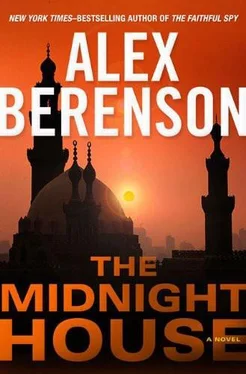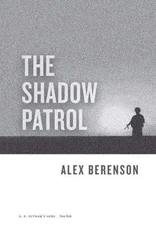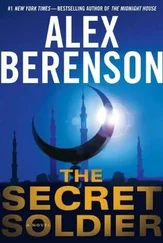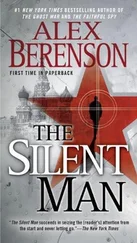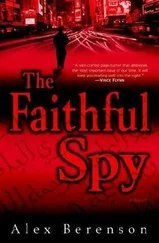Alex Berenson - The Midnight House
Здесь есть возможность читать онлайн «Alex Berenson - The Midnight House» весь текст электронной книги совершенно бесплатно (целиком полную версию без сокращений). В некоторых случаях можно слушать аудио, скачать через торрент в формате fb2 и присутствует краткое содержание. Жанр: Шпионский детектив, на английском языке. Описание произведения, (предисловие) а так же отзывы посетителей доступны на портале библиотеки ЛибКат.
- Название:The Midnight House
- Автор:
- Жанр:
- Год:неизвестен
- ISBN:нет данных
- Рейтинг книги:3 / 5. Голосов: 1
-
Избранное:Добавить в избранное
- Отзывы:
-
Ваша оценка:
- 60
- 1
- 2
- 3
- 4
- 5
The Midnight House: краткое содержание, описание и аннотация
Предлагаем к чтению аннотацию, описание, краткое содержание или предисловие (зависит от того, что написал сам автор книги «The Midnight House»). Если вы не нашли необходимую информацию о книге — напишите в комментариях, мы постараемся отыскать её.
The Midnight House — читать онлайн бесплатно полную книгу (весь текст) целиком
Ниже представлен текст книги, разбитый по страницам. Система сохранения места последней прочитанной страницы, позволяет с удобством читать онлайн бесплатно книгу «The Midnight House», без необходимости каждый раз заново искать на чём Вы остановились. Поставьте закладку, и сможете в любой момент перейти на страницу, на которой закончили чтение.
Интервал:
Закладка:
But then you shouldn’t be in the field at all. So I’m gonna assume a certain level of competence here. And my point is, you have to guess. And always remember that most of the time there won’t be anyone on you at all. You’ll be playing a little game with yourself. And then sometimes it’s the other thing.
What other thing? someone had asked.
If you’re lucky, unlucky, however you want to look at it, at least once in your career you’ll wind up with a whole platoon on you. Cars, motorcycles, helicopters. I know it seems impossible, but it isn’t, not in Moscow or Beijing or Tehran or a few other places where these little games are taken seriously.
What do we do then?
Abort your meeting. Head for the nearest house of worship. And pray.
WELLS HOPPED the railing and picked through the slow-moving traffic on Talaat Harb. Across the street, stairs led to the underground walkway. Wells stepped down them, not quite running, the camera bouncing in his backpack. He made his way along the tiled corridors of the underpass, past a blind man selling packets of tissues, a grimy teenager wearing a New York Yankees cap. Wells turned right, left, and then jogged along a passage and up a stairway. He’d crossed all the way under the square, to its western edge. From here, a wide avenue, three lanes in each direction, ran west toward the Nile.
Wells stepped around the stairs, positioning himself so he could spot anyone coming up the steps without being seen himself. And sure enough the man in the striped blue shirt emerged from the passageway and jogged up the steps. His cigarette was gone, but he was the same man who was standing next to Wells on Talaat Harb.
Wells heard Raviv’s raspy voice: You found him. Now lose him. Wells stepped onto the avenue as a bus passed, moving maybe fifteen miles an hour. He moved around the back of the bus, then sprinted along its left side, where its body shielded him from the sidewalk. He kept pace, barely. A taxi honked madly at him, and its passenger-side mirror whacked his ass. He stumbled in his robes but didn’t fall. After thirty seconds, the traffic lightened and he crossed to the south side of the road.
The move was ugly and unsubtle, but it worked. Wells was two hundred yards from his pursuer, effectively hidden by the traffic. He kept moving, walking briskly to the Corniche el-Nil, a three-lane road that ran south along the riverbank. He reached into his pocket and tossed the bug into the Nile. It disappeared without even a splash. He looked back, but the tail seemed to be gone. He extended his arm. A battered black-and-white cab pulled over.
“The Hyatt,” Wells said. The hotel was a mile down the Corniche. Before they reached it, Wells touched the cabbie’s arm. “Stop here.”
He paid, waited for the cab to disappear, waited for any sign he’d been followed. But here the Corniche was nearly free of pedestrians and the traffic flowed fast and freely. Wells reached up a hand, hailed another cab. “Northern Cemetery.”
“Which part?”
“The entrance.”
“It has many entrances.” The cabbie looked puzzled but waved Wells in anyway.
As they drove, Wells closed his eyes and tried to think through the tail and the bug. They had to have come from someone at the mosque. Hani, most likely. Maybe someone else in the imam’s office. Possibly the imam himself. Whoever it was, Wells had to expect the Egyptian police to crash his interview with Alaa. He wondered if he should abort the meeting.
“Where are you from?” the taxi driver said abruptly.
Back in America, Wells had forgotten the Arab world’s obsession with ethnicity, its never-ending tribalism. Me against my brother. Us against our cousins. Our family against the family next door. Our block against the next. and on and on, to infinity. Or at least this universe against the next.
“Kuwait.”
“Ahh, Kuwait. Of course. You have business here? Maybe you take day off, I take you to the pyramids. Very exciting, very historical. ” He was off and running, and Wells couldn’t help but smile. One day he really would come back here as a tourist. He wondered who’d be with him. Or if he’d be alone.
THE CABBIE WAS STILL TALKING as they headed up a low rise. Ahead, the road seemed to dead-end at a wide avenue, almost a highway, six lanes of cars heading north and south. Beyond the avenue, a jumble of buildings loomed, darker and lower than the rest of the city. The cabbie pointed at them. “Northern Cemetery.”
“I can’t wait.”
The cabbie drove through a short tunnel that ran under the avenue and opened into the cemetery. He stopped in front of four nut-brown men sitting in folding chairs, passing a sheesha.
Wells paid the driver, unfolded himself from the cab. The men in the chairs looked curiously at him as it pulled away, trailing diesel smoke. Hani wasn’t among them, and Wells didn’t recognize any of them from the mosque. They were arranged in front of a store whose shelves, as far as Wells could tell, held only cardboard boxes of spark plugs.
“Salaam alekeim.”
“Alekeim salaam.”
The men’s galabiyas were gray with dust, their bodies limp, as if they had been sitting for so long that they were molded to the chairs. They could have been forty, or seventy. They struck Wells as the Egyptian equivalent of the old men who had — in the days before Wal-Mart and air-conditioning — sat in town squares in the South and watched the world go by.
“May I sit?” Wells asked the man on the far right. He seemed younger, or at least more awake, than the others.
“Sit, sit.”
Wells plopped down. Based on the regularity of the traffic passing them, the road through the cemetery seemed to be a major route to eastern Cairo. Wells couldn’t help feeling that running roads through a graveyard was somehow disrespectful. Yet did the dead prefer the loneliness of the immaculately maintained cemeteries in the United States? At least this way they were connected to the city where they had lived.
What nonsense, Wells thought. In truth, if this place proved anything, it was the foolishness of ghost stories. Wells didn’t claim to know where the dead went. But he was sure they weren’t here. Their bones might be, but their spirits were long gone.
The man next to him moved a few degrees toward vertical.
“I am Essam.”
“Nadeem.”
“You visit the cemetery?”
“Yes.”
“Now? At this hour?”
“Why not?”
Essam didn’t seem to know what to say next. He slumped in his seat, reached for the sheesha. Its coals were out. He whistled sharply. A very small and very dirty boy, no more than ten years old, emerged from the spark-plug store, carrying tongs and a brass brazier trailing white smoke. He plucked two red-black coals from the brazier, arranged them on the sheesha.
“You like to smoke?” the boy said to Wells. “Very good smoke. Apple, cherry, strawberry, melon—”
“No, thank you.”
“Very good smoke.” The boy tugged at Wells’s galabiya with a small hand black with coal dust. “You Kuwaiti?”
“Not you, too. Shouldn’t you be asleep?” Then Wells realized why the boy had asked. “Yes. Kuwaiti. You have something for me?”
The boy ran inside the store, reemerging with a piece of paper. “For you. One pound.”
“Who gave you this?”
“One pound.” One Egyptian pound was about twenty cents.
Wells gave him a pound, received the note in return. “Keep walking,” it said in Arabic. Nothing more. “Who gave you this?” But the boy had already gone back to spark-plug heaven.
“Who left this?” Wells said. “A fat man?” As an answer, Essam put the sheesha pipe to his mouth and took a long draw. He closed his eyes as the coals glowed red and the sheesha burbled happily. Wells stood, looked at the crumbling brick buildings around him, wondering if he was being watched, by the muk or the jihadis or both. But nothing moved.
Читать дальшеИнтервал:
Закладка:
Похожие книги на «The Midnight House»
Представляем Вашему вниманию похожие книги на «The Midnight House» списком для выбора. Мы отобрали схожую по названию и смыслу литературу в надежде предоставить читателям больше вариантов отыскать новые, интересные, ещё непрочитанные произведения.
Обсуждение, отзывы о книге «The Midnight House» и просто собственные мнения читателей. Оставьте ваши комментарии, напишите, что Вы думаете о произведении, его смысле или главных героях. Укажите что конкретно понравилось, а что нет, и почему Вы так считаете.
